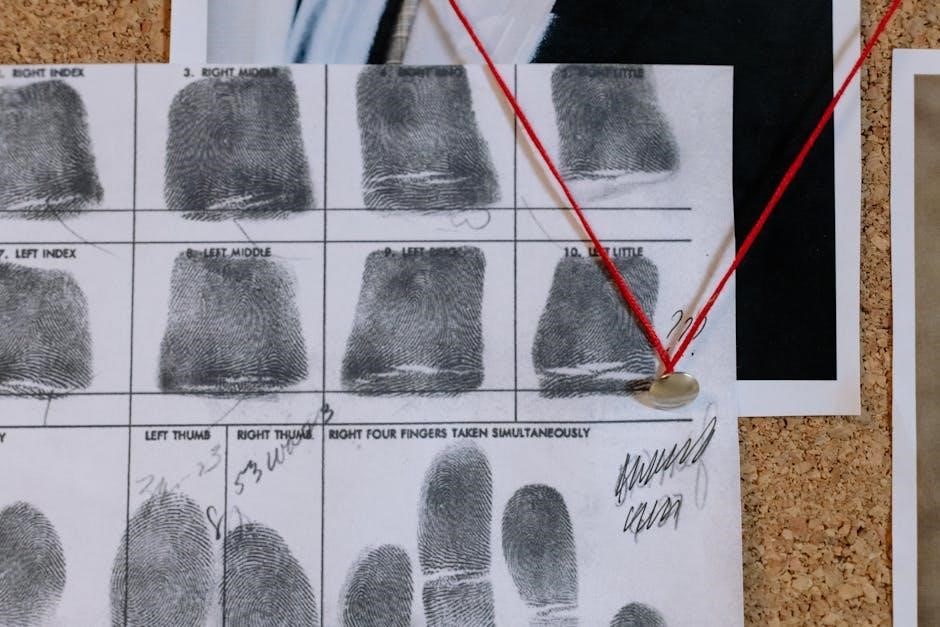Trevor Noah’s memoir‚ Born a Crime‚ recounts his upbringing in South Africa during apartheid‚ exploring themes of identity‚ race‚ and resilience with humor and raw honesty.

Historical Context of South Africa During Apartheid
South Africa under apartheid was marked by systemic racial segregation‚ enforced by oppressive laws that divided society into rigid racial categories‚ perpetuating inequality and violence.
2.1 The Apartheid System

The apartheid system in South Africa was a legal framework enforcing racial segregation and discrimination. It classified people into racial groups—white‚ black‚ colored‚ and Indian—dictating where they could live‚ work‚ and marry. Laws like the Population Registration Act and Group Areas Act institutionalized this divide. Whites held exclusive political power‚ while non-whites faced severe restrictions‚ including limited access to education and employment. The system was enforced through violent means‚ including forced removals‚ police brutality‚ and banning of opposition leaders. This segregation created deep economic and social disparities‚ with black communities bearing the brunt of poverty and marginalization. The apartheid regime’s policies were internationally condemned‚ leading to economic sanctions and global activism against the system. Understanding this context is crucial to grasping Trevor Noah’s experiences in Born a Crime.
2.2 The Role of Race and Identity
Race and identity were central to life in apartheid South Africa‚ where the government imposed rigid racial classifications. Trevor Noah‚ born to a black mother and white father‚ navigate this system. His mixed heritage made him an outcast under laws forbidding interracial relationships. Race defined every aspect of life‚ from where you lived to the opportunities available. Trevor’s experiences highlight the absurdity of apartheid’s racial hierarchy‚ as he often found himself caught between worlds. His mother’s black identity and his father’s whiteness created a complex dynamic‚ shaping his sense of self. The memoir explores how race dictated social interactions‚ economic possibilities‚ and even personal safety. Trevor’s struggles with identity reflect broader themes of belonging and resilience in a system designed to divide.

Trevor Noah’s Personal Story
Trevor Noah’s journey‚ born to a black mother and white father during apartheid‚ explores his early struggles‚ unique identity‚ and resilience in a racially divided South Africa.

3.1 Early Life and Family Background
Trevor Noah was born in Johannesburg‚ South Africa‚ during the apartheid era‚ to Patricia Nombuyiselo‚ a black Xhosa woman‚ and Robert‚ a white Swiss-German father. His birth was illegal under apartheid laws‚ which prohibited interracial relationships. Noah spent his early years in Soweto‚ protected by his mother’s resilience and resourcefulness. Despite the oppressive regime‚ Patricia instilled in him a strong sense of self-worth and identity. The family faced constant challenges‚ including societal rejection and legal threats‚ shaping Noah’s early understanding of race and belonging. His mixed heritage made him an outsider in both black and white communities‚ a theme that would later define his storytelling. This unique upbringing laid the foundation for his sharp wit and perspective on the world around him.
3.2 Key Anecdotes from the Book
Trevor Noah shares vivid stories from his childhood‚ such as his mother‚ Patricia‚ defying societal norms to protect him. A pivotal moment was when he accidentally set a garage on fire‚ showcasing his mischievous nature. These anecdotes highlight his struggle with identity and belonging‚ as well as his resilience in the face of adversity. Noah’s storytelling weaves humor with poignant reflections on race and family‚ offering a unique perspective on growing up under apartheid. These tales not only entertain but also provide insight into the challenges of navigating a divided world‚ shaping his worldview and eventual career as a comedian and storyteller.

Themes and Messages in “Born a Crime”
The memoir explores themes of identity‚ race‚ and apartheid‚ blending humor with poignant reflections on family‚ belonging‚ and resilience‚ offering universal lessons on navigating societal divides and personal adversity.

4.1 Identity and Belonging
Trevor Noah’s journey in Born a Crime delves deeply into the complexities of identity and belonging‚ shaped by South Africa’s apartheid regime. As a biracial child‚ Noah navigate
4.2 Race and Apartheid

In Born a Crime‚ Trevor Noah examines the oppressive racial hierarchy of apartheid South Africa‚ where race dictated every aspect of life. The system classified people into rigid categories‚ denying basic rights to non-whites. Noah’s biracial identity made him a target of discrimination‚ as his existence defied apartheid’s legal and social norms. The book vividly portrays how race determined access to education‚ housing‚ and freedom‚ creating a society of deep inequality. Noah’s personal anecdotes‚ such as his mother’s defiance and his own struggles with identity‚ illustrate the human cost of apartheid’s racism. Through humor and poignant storytelling‚ Noah exposes the absurdity and cruelty of a system that dehumanized millions‚ offering a powerful critique of institutionalized racism and its lasting impact. His experiences highlight the resilience of those who resisted apartheid’s dehumanizing policies.
4.3 Humor and Resilience
In Born a Crime‚ Trevor Noah uses humor as a powerful tool to navigate the harsh realities of growing up in apartheid South Africa. His witty storytelling and ability to find light in darkness highlight the resilience of those who endured systemic oppression. Noah’s humor not only entertains but also serves as a coping mechanism‚ reflecting the broader cultural attitude of South Africans who laughed in the face of adversity. His anecdotes‚ such as mischievous childhood antics and clever ways to survive poverty‚ showcase how humor became a form of resistance. By blending comedy with poignant reflections‚ Noah illustrates how laughter and resilience were essential for survival under apartheid. His narrative style underscores the idea that humor can humanize even the most painful experiences‚ offering readers a universal lesson in finding strength through laughter and perseverance. This duality of humor and resilience is central to the book’s emotional and cultural impact.

The Impact and Legacy of “Born a Crime”
Born a Crime has left a lasting impact‚ sparking global conversations on race‚ identity‚ and resilience. Its cultural relevance and literary acclaim solidify its legacy as a modern classic.
5.1 Cultural and Social Relevance
Trevor Noah’s Born a Crime holds significant cultural and social relevance by shedding light on the complexities of apartheid and its aftermath. Through personal anecdotes and sharp commentary‚ Noah bridges the gap between his South African roots and global audiences‚ fostering empathy and understanding. The book challenges stereotypes and encourages dialogue about race‚ identity‚ and inequality. Its ability to resonate across cultures has made it a vital tool for discussions on social justice and human rights. By sharing his story‚ Noah not only preserves his heritage but also contributes to a broader conversation about injustice and resilience‚ making it a timeless and universally relevant work. The memoir’s impact is further amplified by its accessibility‚ blending humor with harsh realities to engage readers worldwide. This cultural significance ensures its continued relevance in modern society.
5.2 Literary Reception and Reviews
Trevor Noah’s Born a Crime received widespread critical acclaim and commercial success. The memoir has been praised for its blend of humor‚ insight‚ and raw honesty‚ offering a unique perspective on life under apartheid. Reviewers highlight Noah’s ability to balance lighthearted anecdotes with profound reflections on race‚ identity‚ and inequality. The book has been noted for its accessibility‚ making complex societal issues relatable to a global audience. Many critics have commended Noah’s storytelling prowess‚ which underscores the universality of his experiences. The memoir has appeared on numerous bestseller lists and has won several awards‚ solidifying its place in contemporary literature. Its literary success is a testament to its ability to resonate with readers from diverse backgrounds‚ sparking important conversations about justice‚ resilience‚ and human connection. The book’s impact continues to grow‚ ensuring its relevance for years to come.
5.3 Personal and Universal Lessons
Born a Crime offers deeply personal and universally relatable lessons‚ drawn from Trevor Noah’s experiences growing up in South Africa. The memoir highlights the importance of finding humor in hardship and the resilience needed to navigate societal constraints. Noah’s journey underscores the struggle for identity and belonging‚ particularly under oppressive systems like apartheid. One key lesson is the power of self-acceptance and the ability to thrive despite systemic limitations. The book also teaches the value of empathy and understanding‚ encouraging readers to see beyond their own perspectives. Noah’s story transcends his personal circumstances‚ offering insights into overcoming adversity and the importance of human connection. These lessons resonate globally‚ making the memoir a powerful tool for reflection on race‚ identity‚ and the shared human experience. The book’s universal appeal lies in its ability to inspire hope and resilience in the face of challenges.
Born a Crime is a captivating memoir that offers a unique perspective on life in South Africa during apartheid. Trevor Noah’s story is a testament to resilience‚ humor‚ and the human spirit’s ability to thrive in adversity. The book masterfully blends personal anecdotes with broader societal commentary‚ making it both deeply relatable and universally relevant. Noah’s journey from a challenging childhood to global success underscores the power of determination and the importance of understanding one’s identity. Through his experiences‚ readers gain insight into the complexities of race‚ culture‚ and belonging. Born a Crime not only reflects on the past but also invites readers to reflect on their own lives and the world around them. It leaves a lasting impression‚ reminding us of the enduring power of hope and the importance of embracing our shared humanity. The memoir is a timeless story of overcoming obstacles and finding one’s voice.
